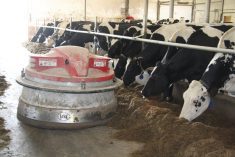MOOSE JAW, Sask. – The Canadian cattle industry wants the federal Competition Bureau to examine the mothballed XL Foods beef plant in Moose Jaw.
The National Cattle Feeders Association has written to the bureau asking that it consider the plant’s future.
Bill Jameson, NCFA chair and a board member of the Saskatchewan Cattlemen’s Association, told an SCA district meeting Oct. 19 that the industry is concerned about the shortage of federally inspected slaughter and processing facilities.
“I guess where the industry is coming from is there’s what the industry considers a viable plant in Moose Jaw that’s not in operation,” he said. “As it stands right now with the announcement of the permanent closure (of XL), there’s really no processing done between Brooks, (Alta.,) and Guelph, (Ont.,) in Canada, which is a huge area.”
Read Also

Soybean market still figuring out implications of China-U.S. pact
Soybean futures had a muted reaction to the U.S. trade deal with China as the market tries to figure out the nuances of the deal.
Jameson said when XL was buying the assets of Lakeside in Brooks, the company assured the government and the Competition Bureau that the deal wouldn’t result in plant closures.
In 2009, shortly after the Moose Jaw plant was first closed, a Competition Bureau official told the House of Commons agriculture committee that the bureau was concerned but accepted the explanation of a temporary shortage of cattle.
Now that the plant has been permanently closed, the NCFA wants the bureau to take another look.
XL Foods and the Competition Bureau did not reply to requests for comment.
Jameson adds that there were problems with the Moose Jaw plant including its lack of a fabrication line and he doesn’t blame XL for closing it.
“Over the years that they’ve run this plant, they’ve had to take a lot of their dressed product on a carcass basis back to Calgary. There’s no question there are costs involved with that.”
When XL bought the Moose Jaw plant from the Saskatchewan government, it had processing capability at a second location. It closed that part of the operation several years later.
Before BSE was found in Canada, XL operated without the fabrication line but Jameson said it would be difficult now for anyone to do so.
XL has not said the Moose Jaw facility is for sale. Jameson said a resolution from both the NCFA and the SCA asks the Competition Bureau to look at the situation and determine whether the plant would be viable if someone else owned it.
“Is there someone out there who would purchase that plant and build a fab line? I guess if it’s not for sale, we’ll never know.”
SCA president Jack Hextall said the province with the second largest cow herd should have slaughter capability.
“Our position is that we need a federally inspected plant,” he said. “Our objective would be to get it open as soon as possible.”
But if XL is not going to reopen it, Hextall couldn’t say who would.















